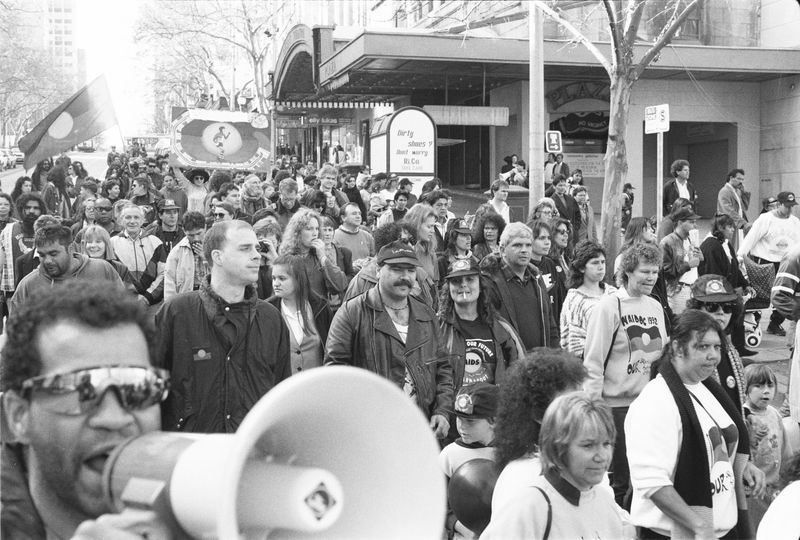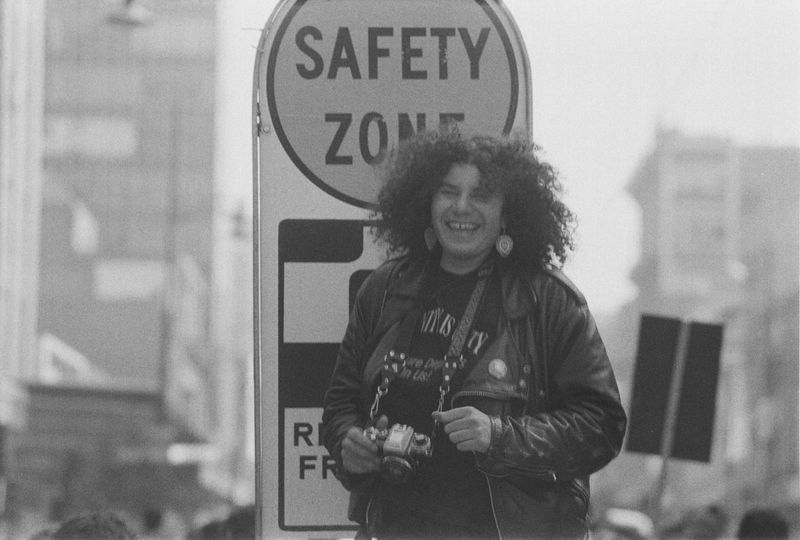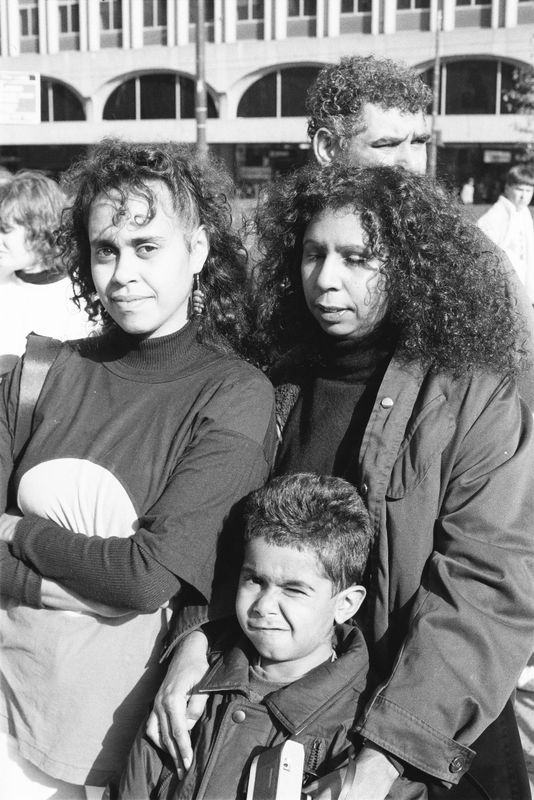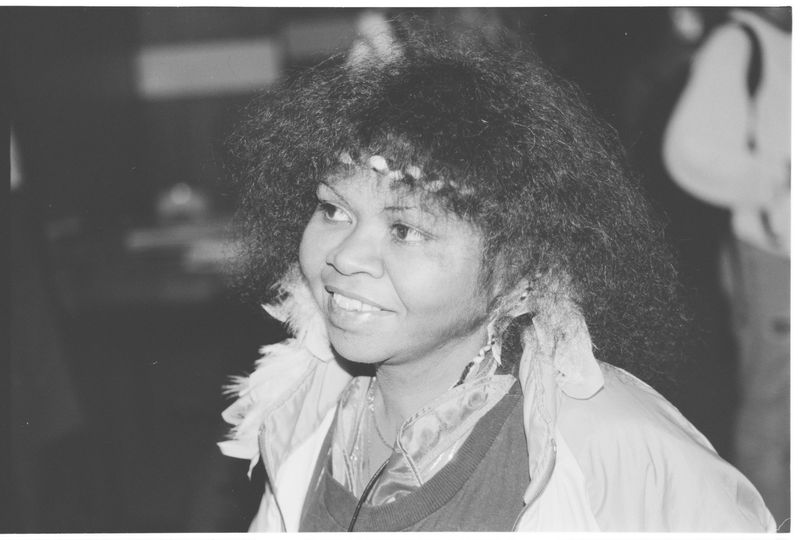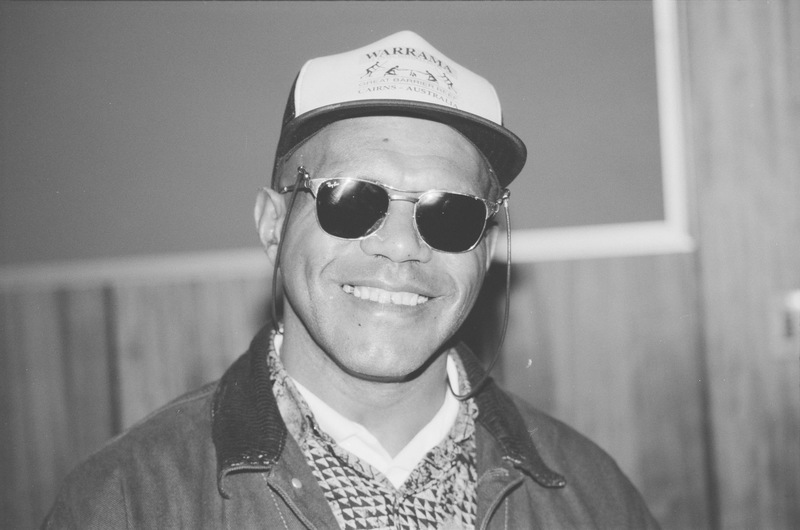Art & Music
Below Richard Frankland highlights the importance of Aboriginial artists, actors, filmmakers and musicians in strengethning Aboriginal cultural identity and nation building.
Richard Frankland, Charmaine Clarke, Tony McCartney, Linda Bamblett?, Michelle, Jeanie McIntyre, Len, Aunty Merle Jackomos, Sandra Mullett, Janine Coombs, Esme Bamblett, Geraldine Bamblett, Allison Walker, ? Hood, Herb Pettit (then field officer with the Aboriginal Legal Service)
"[In the early 1990s] it became apparent to me... that we had no choice but to get into people's lounge rooms, onto their radios, their TVs. And so the concept of when you've got art, you've got voice, and when you've got voice, you've got freedom, and when you've got freedom, you've got responsibility, came to me at that time. I certainly wasn't the first to act in that regard. There were some great musicians and some incredible visual artists and a few filmmakers as well, [but] very few."
Richard Frankland (18 December 2020)
Lisa Bellear
"I was very interested in the arts. And when people such as Maree, and Lisa Bellear [started] taking photographs [they had this]... amazing passion of presenting our culture without cultural interpretation. So the environment they were doing it in, and particularly [for] the women, was... a largely misogynist society with this white patriarchy opening doors at their [white] behest, not at ours, for us to access the wealth and power of a stage or a gallery. There were limited spaces, but these people were tenacious, our warriors were tenacious in knocking on doors and trying to... find resources to present [their work]."
"Lisa had... an incredible habit of taking photos, and then she'd carry round a bag of envelopes and she'd pull a photograph off if she'd taken one of you at some prior event, and give it to you. And… you didn't realise the profound thing that they were doing at the time, documenting us and our voice and the development of our voice. So the context of these photographs is not just about an artistic historical event. It's actually about... a time when we were forging open the doors to be seen as human. And we were, we artists at that time, just as our political leaders, our organisation leaders, our youth workers, we were forging open these doors to change the attitude of a nation. And it really was a time when we began to unravel at a further stage, the cultural tapestry of a nation."
Richard Frankland (18 December 2020)
Sonja Hodge. Carl Clarke standing behind Maree Clarke. Aaron Clarke in front.
"...what Ngũgĩ wa Thiong'o, the Kenyan intellectual said was, "When you were colonised, they drop a cultural bomb on you. Then they teach you that your past is a cultural wasteland". And what our artists did then, what they did before then, and what they do now, and what they'll do in the future, is diffuse that cultural bomb. And they'll re-seed the cultural wasteland in such a way that we will create a new cultural tapestry of a new nation and challenge an identity. So the significance of these photographs is about nation building. It's about nation changing. It's about changing the attitude of a nation in such a way that one day we'll have a place that we can all call home and all be culturally safe."
"When I see Maree's work [photographs], what I see is someone presenting warriors. Someone presenting the oldest culture in the world and how it survives, adapts and achieves. And... that's the voice of it, is we're resisting and being resistant and resilient in our trauma... trauma management. And in the way we present art. And art's our tool to do that."
Richard Frankland (18 December 2020)
Ruby Hunter & Archie Roach
"All of these great artists, these very brave and courageous people, are rungs on a ladder towards some type of equity and justice. They're... often lost in history. And when we search through the lyrics of First Nations peoples' songs... we find absolute gold. When we look at our visual art, artists. All... of that is, to me, a representation of cultural strengthening. Of seeking out, not just equity and justice, but seeking out cultural authority. A story is the essence of any culture."
Richard Frankland (18 December 2020)
Note: The photographs of Ruby Hunter and Archie Roach were not taken during NAIDOC week, however, Ruby and Archie were both performing at this time, and were drawing community together through their music.
